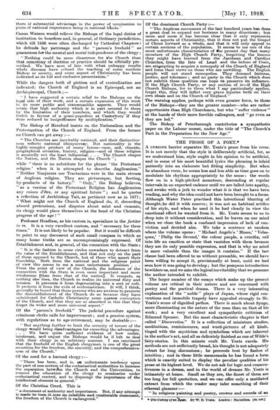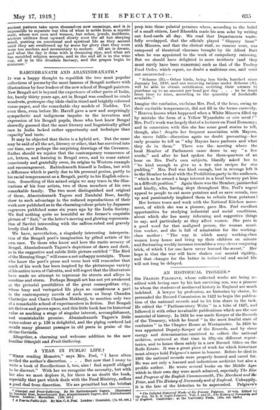THE PROSE OF A POET.*
A 0131110II9 barrier separates Mr. Yeats's prose from his verse. It- is not merely that the style is deliberately artificial, for, as we understand him, style ought in his opinion to be artificial, and in some of his most beautiful lyrics the phrasing is inlaid patiently into an elaborate but fitting simplicity. But when he abandons verse, he seems leas and less able as time goes on to modulate his rhythms appropriately to the sense; the words flow on in a high-pitched monotone, descending at regular intervals in an expected cadence until we are lulled into apathy, and awake with a jerk to wonder what it is that we have been reading, and why the idea could not have been brought to a focus. Although Water Pater practised this intentional blurring of thought, he did it with reserve; it was not an habitual artifice of his style, and when he used it he had clearly in view the emotional effect he wanted from it. Mr. Yeats seems to us to drop into it without consideration, and he leaves on our mind 'when we close the book a confused impression of lack of con- viction and decided aim. We take a sentence at random
where the volume open's "Michael Angelo's Moses,' 'Velaaquez," Philip the Second,' the colour purple, a crucifix, call into life an emotion or state that vanishes with them because they are its only possible expression, and that is why no mind is more valuable than the images it contains." If the last clause had been offered to us without preamble, we should have been willing to accept it, provisionally at least, until we had seen how it was going to develop ; but the pompous introduction bewilders us, and we miss the logical inevitability that we presume the author intended to exhibit.
The larger number of the essays which make up the present volume are critical in their nature and are concerned with poetry and the poetical drama. There is a very interesting explanation of the " noble " playa of Japan, whose rigid con- ventions and immobile tragedy have appealed strongly to Mr. Yeats's sense of dignified pathos. There is much about Synge, more illuminating on the nature of the man than on that of his work ; and a very excellent and sympathetic criticism of Edmund Spenser. But the most characteristic chapter is that called "Discoveries." It is a collection of miniature studies, meditations, reminiscences, and word-pictures of all kinds, tinged with the mysticism and symbolism which are inherent in the author's art, and all as delicately finished as one of Wilde's fairy-stories. In this minute craft Mr. Yeats excels. His methods are not sufficiently-broad, his thought is not adequately robust for long discussions; he proceeds best by flashes of intuition ; and in these little memoranda he has found a form which is exactly suited to display the peculiar qualities of his prose at its highest level. We do not ask for logic and coneecm tivenese in a dream, and in the world of dreams Mr. Yeats is intimately at home. Small as they are, the finest of them are too long for full quotation, and we can offer only a mutilated =tract from which the reader may infer something of their ethereal glamour :—
" In religious painting and poetry, crowns and swords of an
*WigrttWing kfiriNfare. By-W. B. Yestk Dudes-. MacztllUss. 185..et:1
ancient pattern take upon themselves new meanings, and it is impossible to separate our idea of what is noble from a mystic stair, where not men and women, but robes, jewels, incidents, ancient utilities float upward slowly over the all but sleeping mind, putting on emotional and spiritual life as they ascend until they are swallowed up by some far glory that they even were too modern and momentary to endure. All art is dream, and what the day is done with is dreaming ripe, and what art has moulded religion accepts, and in the end all is in the wine cup, all is in the drunken fantasy, and the grapes begin to stammer."



































 Previous page
Previous page